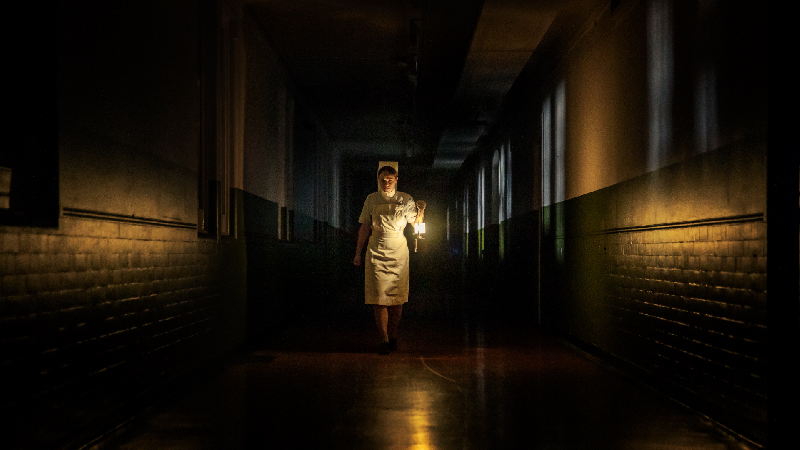




Corinna Faith’s independent British hospital set horror has a captivating appeal. Set in 1974, when a period of unrest between the UK government and the coal miners led to a scampering to ration electricity, she sinks her imaginative tentacles into our fear of the dark. Trainee nurse Val (Rose Williams), arrives for her first day at the crumbling East London Royal Infirmary. With most of the patients and staff evacuated to another hospital, she’s forced to work the night shift in the dark, near empty building. The walls house a frightening secret that will force Val to confront her own traumatic past, and discover the pain behind the wrath of a malevolent spirit.
The Power’s conventional three act structure is predominantly built around atmosphere, not themes and ideas. Its effectiveness lies in Faith’s reluctance to revert to juvenile jump scares, which are mostly absent apart from a sparing few. Instead she nestles into the unsettling aura of the building, its shadows and history, as well as the propensity for human cruelty, narcissism and judgement. Once the surface of the film is scratched, as in so many horror stories, perhaps the source of terror is humanity and not the supernatural. The truth is likely that we’re caught in the cross-hares of a conflict between the trauma that bridges the realms of the living and the dead, each with their cast of protagonists and antagonists.
The unrest housed in both the hospital and Val’s traumatised psyche echoes the social and political unrest, and the internal hierarchy of hospital politics only hastens us to see Faith’s ghost story as an echo chamber. Genre cinema has a way of effortlessly commenting on broader issues, and at it’s heart Faith’s film is about trauma and institutional abuse. Rather than forcefully using these themes to add an intellectual weight to the story, she leans towards a thematic simplicity that lacks such ambitious overtures. This draws interesting comparisons to Rose Glass’ Saint Maud (2019), another recent British horror about a traumatised young woman, a former nurse turned carer.
Opposite Saint Maud’s thematically richer story made simple, The Power has an honest simplicity. The sparse expression of themes and ideas places the emphasis on mood and atmosphere, while Glass shuts off rooms in the vast house like structure of her story, living out of only a few lit rooms. Of course, there’s nothing wrong with the path either filmmaker takes, and each show a different tack towards simplicity. This reflects a tendency towards silence, of communication repressed in the shadow of trauma, conveyed by each filmmaker.

If we look back to 1999, M. Night Shyamalan’s The Sixth Sense and The Blair Witch Project (Sánchez and Myrick, 1999) are more likely to spring to mind before David Koepp’s Stir of Echoes will, in spite of it being a very good film. Faith’s film is likely to share a similar fate, the shy and quiet child opposite the much-lauded Saint Maud. An interesting question for anyone with an interest in storytelling, albeit it’s one without a definitive answer, is to question why certain films overshadow others?
The Power is an angry cry, a scream even about the cruelty that has scarred many a soul. It’s an example of catharsis through storytelling that’s so often denied victims of trauma in the ‘real world.’ Val is the outsider, a victim of life experiences that have made her afraid of the dark.
A simple and applicable reading of the film would be to assert that its message is of the need to confront our fears to find resolution and catharsis. We might suspect that the film is Faith’s own expression of anger that communicates the empathy many of us feel towards victims of abuse. As an act of catharsis, it has shades of the revenge film, but more deeply it’s a meditation on how each of us belongs to certain social tribes, and how we feed off the energy of others, that creates harmonious and contentious connections.
The film is attempt at bringing order and justice to trauma and cruelty, but as the end credits begin and control slips from Faith’s grasp, if we are to be honest, the evil lurking in the everyday reality will reassert its control over the characters. The Power is film and story as a dream, a soothing mechanism for the horrors that blacken human civilisation. We cannot escape into the shadows of this safe space forever – we must return to the light of day.
The Power is streaming exclusively on Shudder.





















